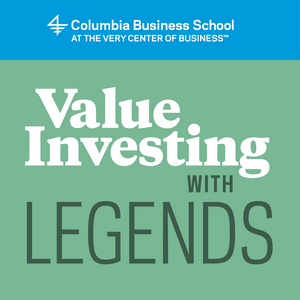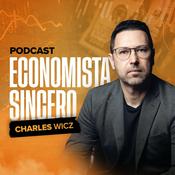71 episódios
- Ricky Sandler, founder, CEO, and CIO of Eminence Capital, joins hosts Michael Mauboussin and Tano Santos to explore a dynamic career spanning over three decades in long-short investing. Starting with stories from his upbringing and early career, Ricky unpacks the foundations of his investment philosophy centered around "change in perception" — a framework shaped by evolving market structures and investor behavior. He shares insights from navigating the 1998 crisis, outlines the value of rigorous risk management, and explains how quality businesses combined with contrarian thinking create lasting opportunities. The conversation also delves into quant integration, thoughtful activism, the nuances of portfolio construction, and his reflections on AI, market structure, and societal risks — and much more!
Key Topics:
● Ricky Sandler's upbringing, tennis, and early exposure to finance (0:00)
● The influence of competitive tennis on his investing mindset (3:58)
● Why he considered law before ultimately pursuing finance (5:55)
● Lessons from early roles at Mark Asset and Fusion Capital (7:30)
● Insights from the 1998 market crisis and developing better risk management (10:06)
● Defining 'change in perception' and its role in investment strategy (12:21)
● Understanding shifts in market behavior post-GFC (14:42)
● COVID-era investment case study: Red Rock Resorts (22:31)
● Portfolio construction principles and balancing risk/reward (27:56)
● Integrating quant and data science at Eminence Capital (33:44)
● Activism and engaged ownership strategies (36:34)
● Thoughts on AI, bubbles, and systemic market risks (38:36)
● Risk management and portfolio design in volatile environments (41:06)
● How Ricky trains his team to distill what matters in investing (42:39)
● AI's role in analyst work and future of research (44:27)
● Worries and hopes for the future: market structure, government debt, and optimism (46:39)
● Book and podcast recommendations (49:30)
● Closing remarks (51:02)
● And much more!
Mentioned in this Episode:
● Eminence Capital
● Ashland Inc.
● Entain
● Red Rock Resorts
● Live Nation
● Meta
● Tesla
● Salesforce
● Zillow
● KKR
● Pluralsight
● Autodesk
● Men's Wearhouse
● Think Again by Adam Grant
● Grit by Angela Duckworth
● Teaming by Amy Edmondson
● Quit by Annie Duke
● Mindset by Carol Dweck
● Invisible Influence by Jonah Berger
● Lessons of the Titans by Tim Ferriss
● 1929 by Andrew Ross Sorkin
Thanks for Listening!
Be sure to subscribe on Apple, Google, Spotify, or wherever you get your podcasts. And feel free to drop us a line at [email protected].
Follow the Heilbrunn Center on social media on Instagram, LinkedIn, and more!
Apple Podcasts
Google Podcasts
Spotify
Email
Heilbrunn Center
Instagram
LinkedIn Robert Robotti - From Pink Sheets to Portfolio Management: Bob Robotti's Value Investing Journey
21/11/2025 | 1h 2minRobert Robotti, President and CIO of Robotti & Company Advisors, joins host Michael Mauboussin to explore a lifetime shaped by value investing. With deep roots in accounting and formative experiences auditing firms like Tweedy, Browne, Bob shares how those early exposures led him to a career buying underfollowed, undervalued companies. In this episode, Bob discusses how his contrarian approach has thrived amid market inefficiencies, especially in cyclical industries and under-the-radar public firms. He breaks down key investments, including Builders FirstSource and Tidewater, and explains why capital allocation, aligned incentives, and patience are critical to long-term success. He also addresses private equity, passive investing, and how AI might affect the future of both business operations and markets — and much more!
Key Topics:
Introduction (0:00)
Bob's upbringing and early exposure to entrepreneurship (2:09)
How auditing Tweedy, Browne sparked Bob's interest in value investing (4:17)
Learning through Tony Pustorino and practical accounting (4:32)
Early influences from Walter Schloss, Joe Reilly, and Tweedy, Browne (5:39)
Experience working with Mario Gabelli (6:57)
Founding Robotti & Company and the original value edge (8:54)
Explaining pink sheet stocks and early investment strategies (10:00)
Philosophy on intrinsic value and discounted investments (14:31)
Mispricings from passive investing and cyclical businesses (16:24)
Views on private equity vs. public markets (19:27)
Being a generalist with deep knowledge in housing and energy (21:45)
Simplified valuation approach and the Builders FirstSource case (23:41)
Portfolio construction, sizing, and turnover explained (28:58)
Maintaining a patient capital base (33:38)
The Tidewater investment: thesis, board involvement, and strategy (36:42)
Capital allocation philosophy: buybacks vs. dividends (49:08)
Executive incentives and importance of management quality (51:02)
How Robotti sees AI impacting business and investing (53:13)
Thoughts on traditional business education and tangible assets (57:13)
Geopolitical risks, China's influence, and global economic concerns (58:03)
And much more!
Mentioned in this Episode:
Robotti & Company Advisors
Tweedy, Browne
Gabelli & Company
Builders FirstSource
Tidewater Inc.
Amrep Corporation
Pulse Seismic Inc.
Museum of American Finance
U.S. Securities and Exchange Commission (SEC)
Lucadia National
Third Avenue Value
Canadian Natural Resources
Think Again by Adam Grant
Grit by Angela Duckworth
Teaming by Amy Edmondson
Quit by Annie Duke
Thanks for Listening!
Be sure to subscribe on Apple, Google, Spotify, or wherever you get your podcasts. And feel free to drop us a line at [email protected].
Follow the Heilbrunn Center on social media on Instagram, LinkedIn, and more!Richard Brekka - From Venture to Secondaries: Richard Brekka on Illiquid Market Advantages
07/11/2025 | 1h 3minIn this episode, host Tano Santos sits down with Richard Brekka, founder and managing partner of Second Alpha, to examine the lesser-known world of secondary investing in private technology companies. With decades of experience—from venture capital to secondary transactions—Richard shares his journey through private equity at Chase and CIBC, his role in building and reviving companies like Gomez Inc., and how that led him to identify a unique investment niche. He explains the mechanics of sourcing deals in illiquid markets, using data and AI to surface hidden gems, and the psychology of getting deals done. The discussion also explores valuations, exits, and policy implications of private market access for 401(k) investors, plus the impact of AI on business fundamentals and much more!
Key Topics:
● Richard's early exposure to entrepreneurship and finance (3:29)
● Lessons from Arthur Laffer and University of Chicago MBA experience (6:15)
● Early career in private equity at Chase and learning value investing (8:12)
● Starting Dolphin Equity Partners after CIBC and early challenges (14:06)
● The rise and fall—and rebirth—of Gomez Inc. (17:18)
● Discovering secondary investing through Gomez's cap table (23:58)
● The founding and investment strategy of Second Alpha (26:29)
● Understanding the structure and dynamics of the secondary market (30:21)
● How Second Alpha sources deals and builds its data pipeline (35:49)
● The process of deal execution and managing rights of refusal (41:11)
● Case study: Prove Identity and growth through secondaries (52:29)
● Thoughts on liquidity, valuation, and 401(k) access to private markets (55:35)
● AI's impact on private companies and investment strategies (59:19)
● Book and podcast recommendations (1:01:34)
● And much more!
Mentioned in this Episode:
● Second Alpha
● Chase
● CIBC
● Gomez Inc.
● Prove Identity
● TouchCommerce
● Arthur Laffer
● Acquired (podcast)
● Warren Buffett – Berkshire Hathaway Annual Letters
● Berkshire Hathaway Annual Shareholder Letters
Thanks for Listening!
Be sure to subscribe on Apple, Google, Spotify, or wherever you get your podcasts. And feel free to drop us a line at [email protected].
Follow the Heilbrunn Center on social media on Instagram, LinkedIn, and more!Amit Wadhwaney - From Montreal to Moerus: Amit Wadhwaney's Deep Value Discipline
24/10/2025 | 1h 8minAmit Wadhwaney, founding partner and portfolio manager at Moerus Capital Management, joins hosts Tano Santos and Michael Mauboussin to trace his unorthodox journey from Bombay to Concordia to founding a value investing firm focused on the balance sheet. Along the way, he discusses his early exposure to Marty Whitman, lessons from Third Avenue's international expansion, and what led him to start Moerus.
Amit outlines the core of his investment approach—asset-based valuation, downside protection, and long-term holding periods—and explains why macro factors are typically disqualifiers, not drivers, in his process. He shares insights into portfolio construction, the role of currency risk, and how Moerus identified undervalued opportunities in places like Argentina, Japan, and the gold sector.
Key Topics:
● Growing up in India and finding investing through chemical engineering and economics (3:04)
● Discovering Marty Whitman via an obscure academic book on value investing (5:05)
● Lessons from selling real estate during Quebec's post-referendum panic (9:23)
● Joining MJ Whitman and watching Third Avenue evolve (11:12)
● Pioneering international value investing at Third Avenue (17:05)
● Founding Moerus Capital: philosophy, culture, and investment constraints (24:38)
● Moerus's asset-based investment framework (28:48)
● Managing macro risk and volatility through conservatism, not forecasts (30:41)
● Risk management: internal, external, and business model-related risks (33:00)
● Portfolio construction, position sizing, and concentration limits (46:39)
● Currency exposure and when to hedge (49:12)
● Case studies: Grupo Galicia and Despegar during Argentina's political shift (51:15)
● What keeps Amit up at night: industrial policy, broken immigration, and political gridlock (1:00:52)
● What Amit is reading—and what the Norton Simon Museum can teach investors (1:03:39)
● And much more!
Mentioned in this Episode:
● Moerus Capital Management
● Third Avenue Management
● MJ Whitman
● Marty Whitman
● Grupo Financiero Galicia
● Despegar.com
● Wheaton Precious Metals
● Major Drilling Group
● Dundee Corporation
● UniCredit
● LATAM Airlines
● Journal of Economic Literature
● Shubik and Whitman's The Aggressive Conservative Investor
Thanks for Listening!
Be sure to subscribe on Apple, Google, Spotify, or wherever you get your podcasts. And feel free to drop us a line at [email protected].
Follow the Heilbrunn Center on social media on Instagram, LinkedIn, and more!- Bill Ackman, founder and CEO of Pershing Square Capital Management, joins hosts Michael Mauboussin and Tano Santos to trace the arc of his investing journey—from his early days in real estate finance to founding Gotham Partners and eventually building Pershing Square into a $30 billion firm. Bill discusses formative moments that shaped his thinking, including his controversial early short of MBIA, the painful lessons of the Valeant episode, and the transformation brought about by adopting a permanent capital structure. He also unpacks his investment philosophy, the importance of durability and moats, and his team's approach to risk, activism, and concentrated investing. Along the way, Bill offers thoughts on AI, higher education, and what excites—and concerns—him about the future — and much more!
Key Topics:
● Bill's near-death experience and early independence (2:19)
● Skills learned at Harvard and lessons from rowing and sales (3:50)
● Real estate foundation and Gotham Partners launch (6:44)
● Early credit derivative bet and discovery of MBIA issues (12:23)
● Formation and lessons from Pershing Square (19:02)
● The three eras of Pershing Square and the importance of permanent capital (21:03)
● Bill's investment philosophy and focus on durable moats (27:31)
● Thoughts on capital-light, network-effect businesses (33:58)
● How Pershing Square handles portfolio concentration and risk (36:30)
● Impact of AI and the resilience of activist investing (40:17)
● Student pitch trends and what makes a strong investment case (43:25)
● What Pershing looks for when hiring investment professionals (47:29)
● What worries and excites Bill today (51:34)
● Recommended reading and X as a research tool (54:34)
● And much more!
Mentioned in this Episode:
● Pershing Square Capital Management
● Gotham Partners
● MBIA Inc.
● Farmer Mac
● Herbalife
● Valeant Pharmaceuticals
● General Growth Properties
● Hilton Worldwide
● Uber Technologies
● Universal Music Group
● Brookfield Asset Management
● The Financial History of Berkshire Hathaway by Adam Mead
● The Compounders: Lessons from 50+ Stories of Business Growth by Travis Wiedower
Thanks for Listening!
Be sure to subscribe on Apple, Google, Spotify, or wherever you get your podcasts. And feel free to drop us a line at [email protected].
Follow the Heilbrunn Center on social media on Instagram, LinkedIn, and more!
Mais podcasts de Negócios
Podcasts em tendência em Negócios
Sobre Value Investing with Legends
Value investing is more than an investment strategy — it's a fundamental way of thinking about finance. Value investing was developed in the 1920s at Columbia Business School by professors Benjamin Graham and David Dodd, MS '21. The authors of the classic text, Security Analysis, Graham and Dodd were the very pioneers of their field and their security analysis principles provided the first rational basis for investment decisions. Despite the vast and volatile changes in the economy and securities markets during the last several decades, value investing has proven to be the most successful money management strategy ever developed. Value investors' success over the second half of the twentieth century proved not only the validity of the value approach, but its preeminence over even the most widely taught and practiced modern investment theory, which was developed in the 1950s and '60s and remains dominant even today.
Our mission today is to promote the study and practice of Graham & Dodd's original investing principles and to improve investing with world-class education, research, and practitioner-academic dialogue. In this podcast you will hear from some of the world's greatest investors, their views on the investment management industry, how they developed their investment process and how they see the field changing over time.
Site de podcastOuça Value Investing with Legends, Jota Jota Podcast e muitos outros podcasts de todo o mundo com o aplicativo o radio.net

Obtenha o aplicativo gratuito radio.net
- Guardar rádios e podcasts favoritos
- Transmissão via Wi-Fi ou Bluetooth
- Carplay & Android Audo compatìvel
- E ainda mais funções
Obtenha o aplicativo gratuito radio.net
- Guardar rádios e podcasts favoritos
- Transmissão via Wi-Fi ou Bluetooth
- Carplay & Android Audo compatìvel
- E ainda mais funções


Value Investing with Legends
Leia o código,
baixe o aplicativo,
ouça.
baixe o aplicativo,
ouça.







































